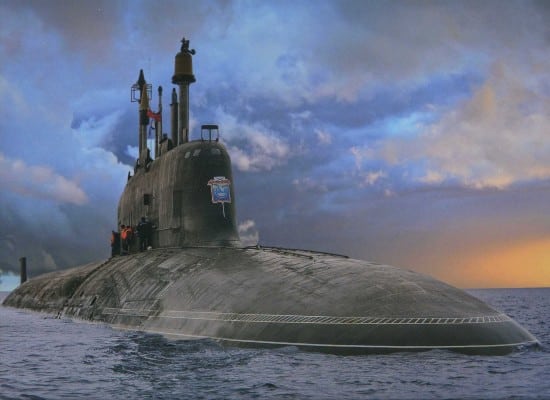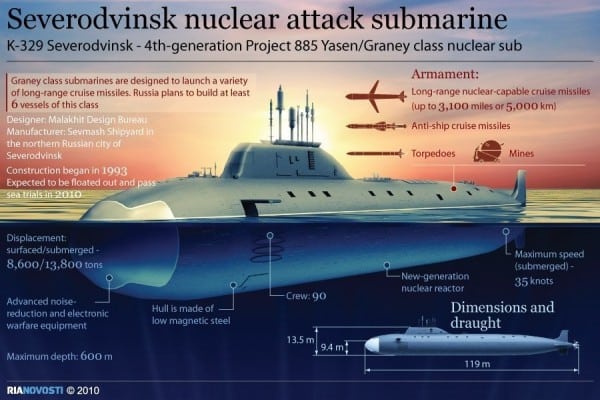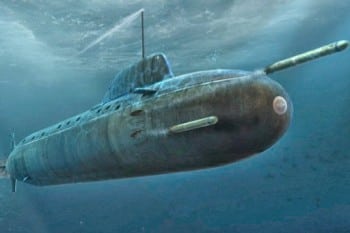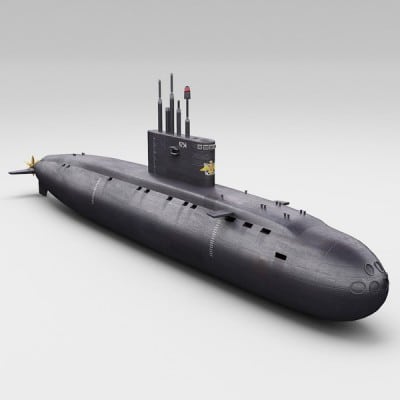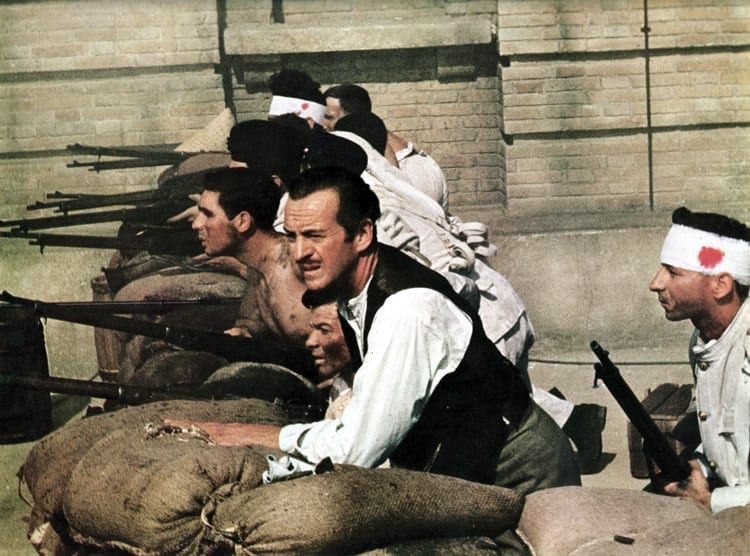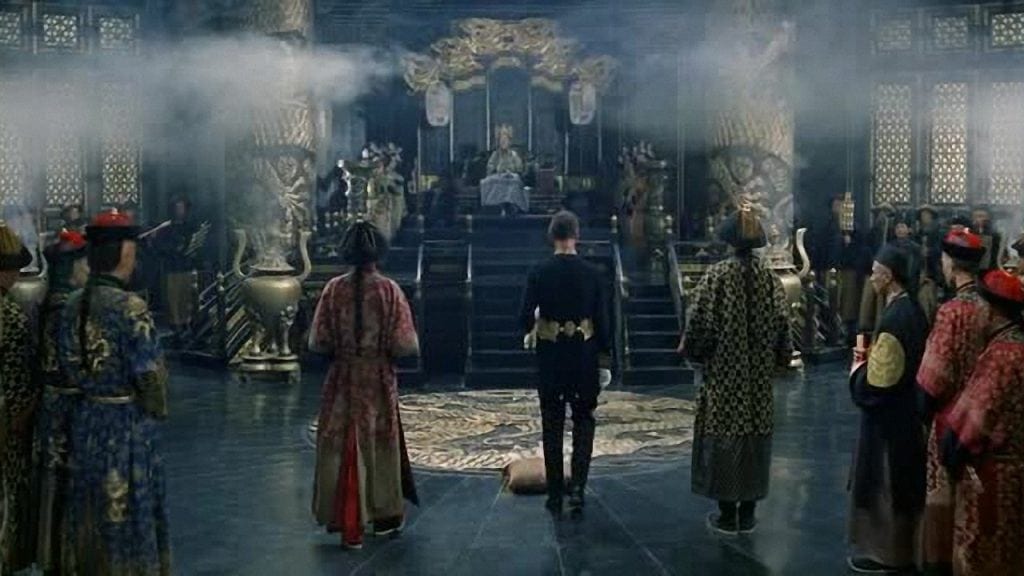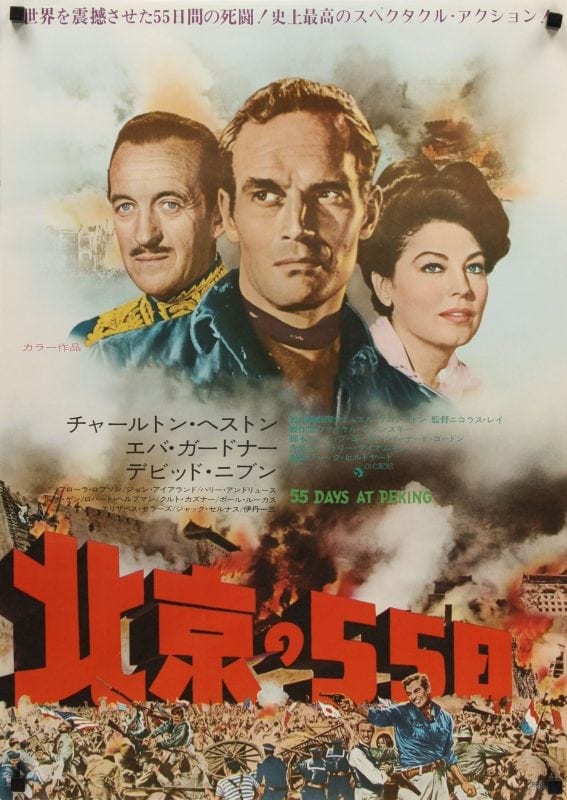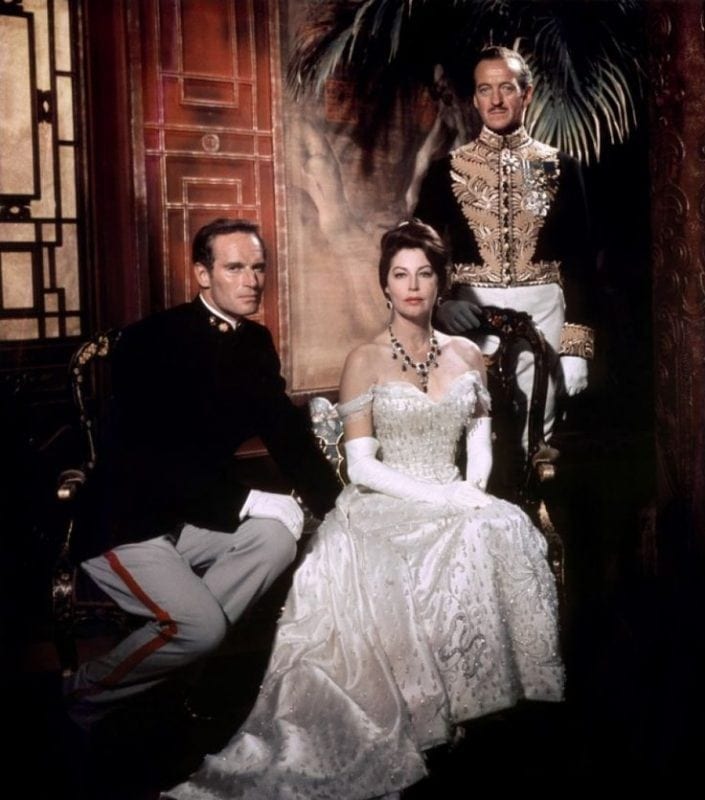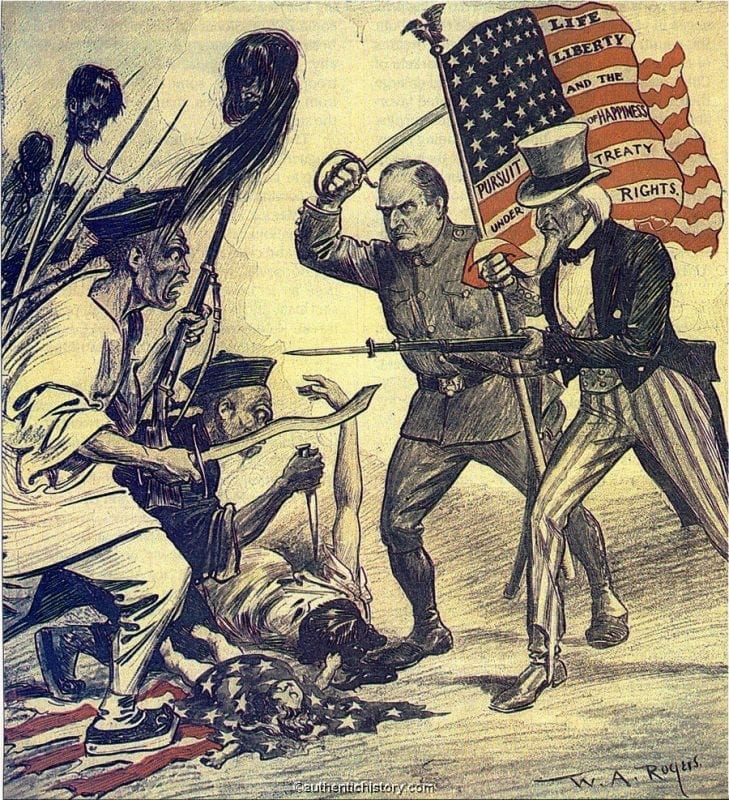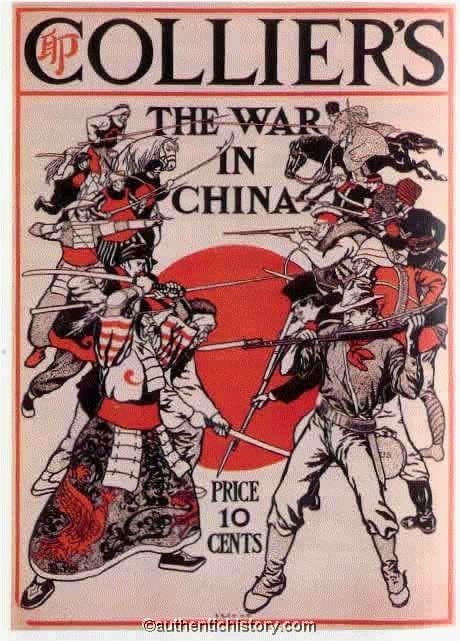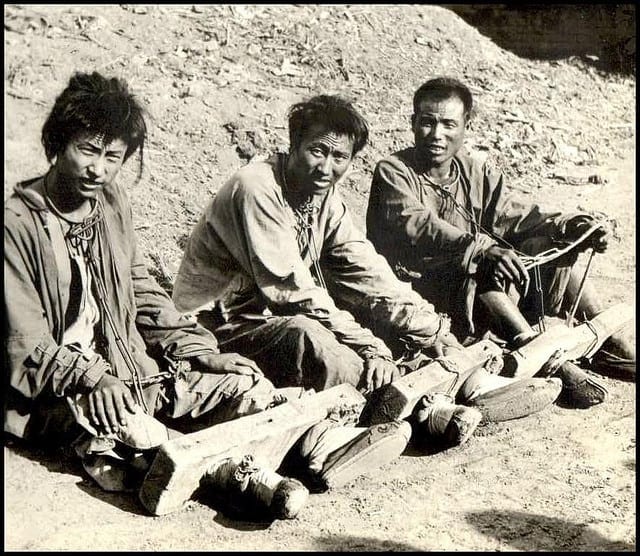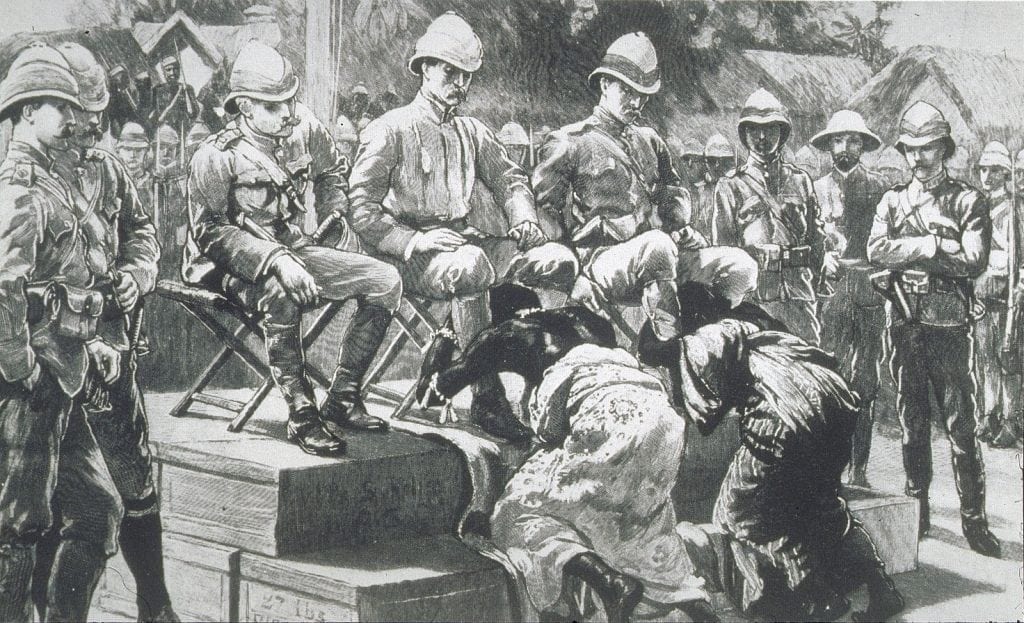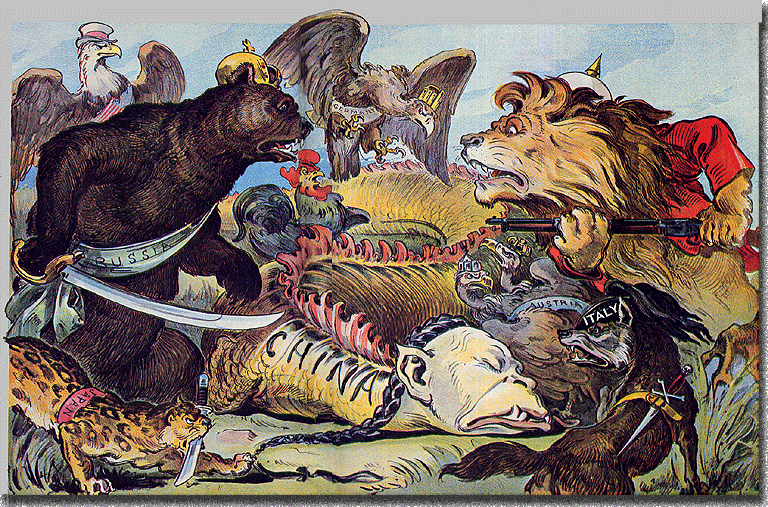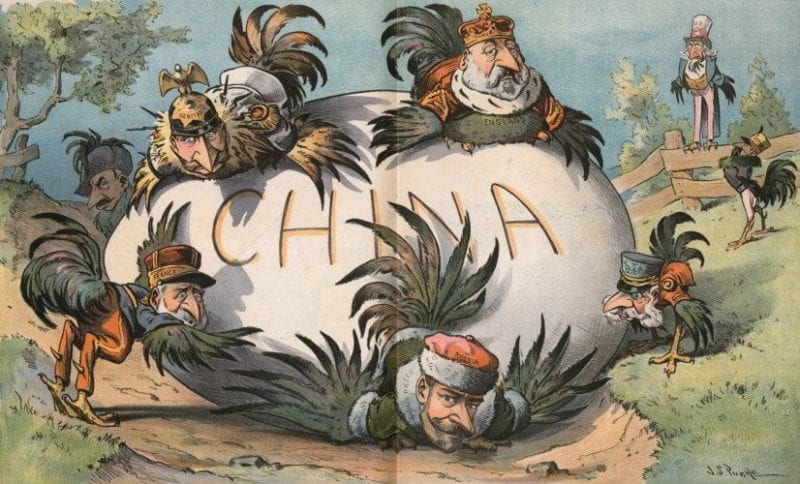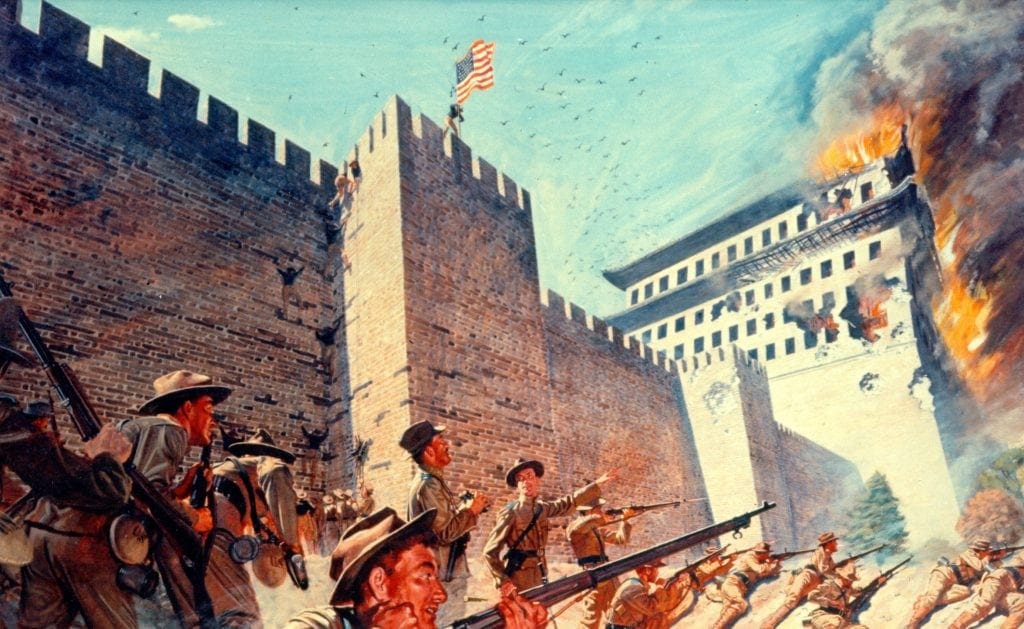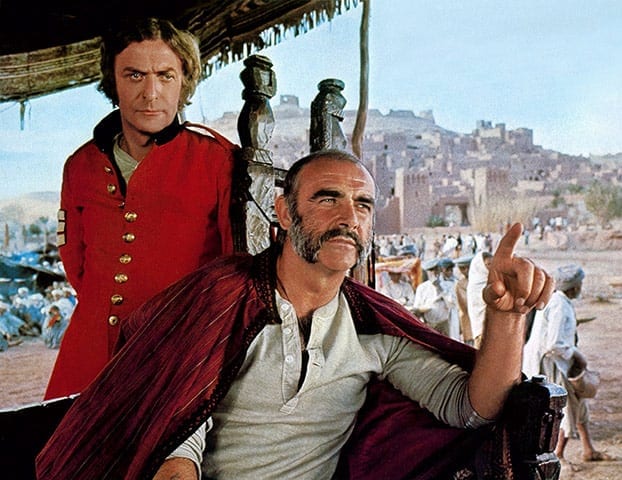Correspondent: Jeff J. Brown | Cross-linked with 44 Days and Sound Cloud
Dispatch from Beijing No. 1 / 2015.6.22
The Hong Kong “umbrella revolution”, managed by Washington, is merely the latest, most visible attempt to destabilize China, says correspondent Jeff Brown. The intrigues continue.
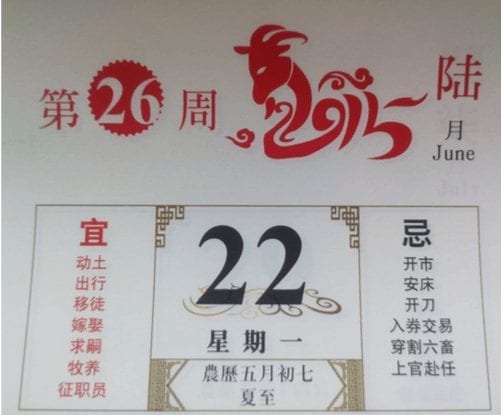
The modern Chinese calendar is a three-in-one affair. In the top center is the Gregorian date, Monday the 22nd, along with its 26th week and the month of June, up top, which is decorated with a stylish logo for the Year of the Ram. Below it on the gold scroll is the Chinese lunar date and below that is the Chinese solar calendar’s reminder that it is the summer solstice. Based on the solar agricultural calendar, to the left in red, is a list of “Do’s”, such as, get married, take a trip and break ground. On the right, in black, is a list of “Don’ts”, like, have surgery, (re)open a store for business or buy/sell an entry ticket. The Chinese calendars have been working like a charm for 4,000 years. (image by www.44days.net)
NOTE: Many links in this article lead to topical radio shows by the author.
Hong Kong
[dropcap]H[/dropcap]appy Dragon Boat Festival on June 20th. Happy Summer Solstice on the 22nd. The first European ship landed on China’s shores in 1513 (the story goes that they lied through their front teeth, to take advantage of oriental hospitality, claiming a damaged ship and severe illness, neither of which was true). Pope Gregory XIII would not correct the ever drifting Julian calendar for another 69 years, in 1582.
Yet, before the European colonialists’ arrival, China had and continues to use its own very sophisticated lunar and solar calendars, going back 4,000 years, around the time Abraham was making his way across the Fertile Crescent, from Sumer to Palestine. Chinese calendars know nothing of the Julian and Gregorian time units, like June, Saturday, Monday and the 20th and 22nd of the month. The Dragon Boat Festival, which dates back to 100-700 years before Christ, depending on which region of China celebrates it, is marked on China’s lunar calendar. The summer solstice is one of the 24 points on the solar, or agricultural version. Like these intertwined, ancient time chronicles, in order to appreciate and understand China, you must know a little about its long, illustrious history.

The Communists led the Chinese people in their heroic struggle to reconquer their dignity and freedom.
The impact of Euroamerican-Japanese colonialism on China reached its zenith during the late 19th and early 20th centuries. It took the Communists to finally liberate and modernize New China, from 1949 until today. Mao Zedong and Deng Xiaoping brought their people from the cruelty and misery of Western colonialism, to China’s rightful place, as an economic titan on the world stage. Xi Jinping is melding their two starkly different visions into his own, the Chinese Dream, so that his citizens can continue to stand tall, proud and independent from foreign exploitation.

Mao during the Long March (Oct.1934-Oct 1935), an strategic retreat from Kuomintang forces to avoid annihilation, with elements of the First Red Army. Later this and other units would coalesce to form the People’s Liberation Army (PLA).
But there were and are some historical blemishes on China’s modern narrative. Taiwan was created with the help of the United States, to serve as an anti-communist, rebel Chinese province. Then, there are Hong Kong and Macau, former colonies of dying Western capitalism. There are also the Diaoyu/Senkaku Islands, “given” to the Japanese by Richard Nixon, just six months before his historic trip to Beijing, in 1972. The many conflicting South China Sea claims are a legal matter that should be decided by the United Nation’s International Tribunal for the Law of the Sea (ITLOS). But Uncle Sam’s pathological, imperial meddling off China’s shores, is making any proper ITLOS judgment impossible.
Last week, Hong Kong’s Legislative Council (Legco, or unicameral legislature) refused to pass a law that would allow all Hongkongers to vote under universal suffrage, for the territory’s chief executive (governor) in 2017. The candidates running would be chosen by Hong Kong’s current Electoral Committee, which was a deal breaker for Hong Kong’s American manipulated, NGO “democrats”. If you are in front of the Great Western Firewall’s mainstream media, propaganda foghorn, you would almost think that China is gunning down these so-called democrats in the streets. The West ignores China’s and Hong Kong’s history for a reason, because the truth lies there for all to see.
Hong Kong’s Legco members, from its colonial founding in 1843, were totally under the iron fist control of London, as was the governor. Hongkongers were not citizens. They were vassal subjects of the British Empire and had few to no rights, except for wealthy local families and their compradors, who lorded over the local 99%, like Ellis, the Lackersteen’s and U Po Kyin, in George Orwell’s semi-autobiographical novel, Burmese Days. Orwell’s characters called the locals niggers, who were economic slaves and treated as such, Hongkongers included. I call these people The Dreaded Other. Andre Vltchek calls them Un-People. Both appellations are from the standpoint of white, Western privilege. The same is true today, as yesteryear. From my hopeful and respectful point of view, I call all the world’s dark skinned peoples, The Moral Majority or The 80%.
The constant repression and official violence needed in Orwell’s colonial Burma, to keep the “niggers” on their knees, was used in Hong Kong as well. Human dignity would regularly boil over and try to free itself from the boot heel of colonial fascism. In 1925-26, Hong Kong was almost destroyed by a mass exodus of locals to the north, into Guangdong (Canton), China. For sixteen months, Hong Kong’s courageous, oppressed 99% went on strike and created their own boycott-divestment-sanction (BDS) movement, in protest over the massacre of more than 60 fellow brothers and sisters, who were gunned down like dogs, on Shanghai’s and Shamian’s streets, by British brown shirts. Hundreds more were injured and many thousands imprisoned. After the popular pilgrimage north, BDS’ed Hong Kong literally became a Twilight Zone ghost town. Only a loan (being good capitalists, it was not a grant) to Hong Kong’s 1% treasury, prevented its opium and morphine fueled, colonial economy from imploding.

The main imperialists arguing at the table, while China protests: Britain, Germany, France, Russia, and Japan. Lesser powers also clawed their way into smaller shares of plunder.
[dropcap]B[/dropcap]ritain’s Hong Kong police state was able to keep Orwell’s “niggers” in their “proper” place, until these 99% were inspired by China’s liberating communist and socialist revolution. Like their soulmates to the north, Hong Kong’s Dreaded Other also wanted to free themselves from the shackles of Western colonialism and imperialism. So they rose up in violent protests in 1956, 1966, 1967, 1981, 1982 and 1984. Through all this, hundreds of Hong Kong’s Un-People were killed and injured, while thousands were arrested. Martin Luther King, Jr. observed, “A riot is the language of the unheard”, which is true whether you are American or Chinese.
Except for Hong Kong’s privileged white people and their wealthy local compradors, such was the reality of life for the colony’s 99%, although behind the Great Western Firewall, the world’s former drug depot was and is vaunted as a halcyon utopia of unfettered “free” trade and “unregulated” capitalism. Thus, when Margaret Thatcher came to the negotiating table with Deng Xiaoping and China’s Communists in 1984, it was not out of altruism or a sense of justice. She and London were desperate to unhinge themselves from Hong Kong’s ignominious, 140-year Burmese Days history. They were sitting on a powder keg of anti-British hatred and they knew it.
SIDEBAR—CLICK ON THE BAR BELOW FOR A MINI REVIEW OF HOLLYWOOD’S ENDORSEMENT OF COLONIALISM
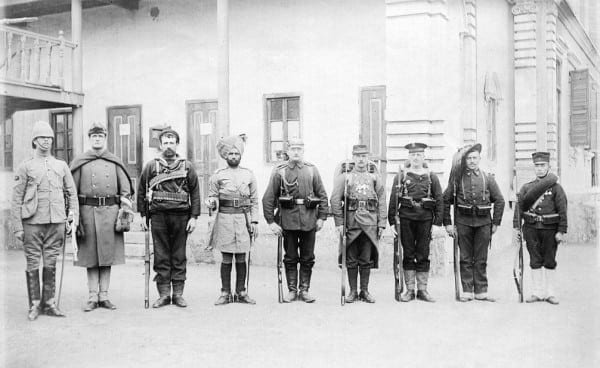
Eight nations participated in the defeat of the Boxer rebellion, and Britain invested some of her colonial and dominion troops. (Click to expand image.)
[learn_more] [dropcap]T[/dropcap]he humiliating colonialist past is hardly forgotten in China. The West has never given up its habit of looking upon nonwhite populations as inherently inferior, or subject to domination, and for a long time regarded the Far East, along with Africa and other regions, as ripe for the plucking. China and India constituted the major prizes, and force and treachery were regarded as the natural and legitimate path, albeit idealized as a “civilizing mission.” As late as 1963, Hollywood, the West’s main engine for imperialist propaganda before worldwide television, was still producing blockbusters depicting the colonialists as the “heroes” in the plot. A good example of the genre is Sam Bronston’s blockbuster 55 Days at Peking, directed by veteran Nicholas Ray, with Charlton Heston, David Niven, and Ava Gardner in the leads. The film was a dramatization of the siege of the foreign legations’ compounds in Peking (now known as Beijing) during the Boxer Rebellion which took place from 1898-1900 in China. The “natives”, of course, were the heavies, the savages. But it was not difficult for Hollywood to turn the Boxers into villains: rising against highly photogenic heroes is bad enough, but having the temerity to rise against Christianity was seen as unforgivable. (In 1975, Hollywood did it again, this time producing Kipling’s classic The Man Who Would Be King, but this time the natives in the Indian subcontinent were mere silly canvas for the antics of the heroes, Sean Connery and Michael Caine, two non-com renegades in the British army, playing two ingratiating “buddies” bent on having a grand old adventure among the barbarians. Gunga Din had shown the way in 1939.
[/learn_more]
These negotiations went on for years and became what is known as the Basic Law, which came into effect in 1997. Relative to the aforementioned Legco’s vote not to allow universal suffrage for the chief executive in 2017, four Basic Law tenets are germane,
- Hong Kong was reunified with the People’s Republic of China in 1997. In other words, it is 100% under the jurisdiction and control of Baba Beijing (my wry appellation for China’s Communist leadership).
- With Hong Kong now an integral part of Communist China, Baba Beijing promised not to introduce Chinese socialism into Hong Kong for a period of 50 years, or until 2047. Baba Beijing is scrupulously respecting this and calls it one country, two systems, with the proviso that the sovereignty, unity and integrity of the one country takes precedence over the two systems. Until Hong Kong’s phony, fifth column Umbrella Revolution was hatched by Uncle Sam in 2014, Baba Beijing had no reason to be concerned about this caveat.
- There is the possibility, but not the guarantee of universal suffrage for the election of the chief executive, starting in 2017. The key verb here is can be, which is conditional, not will, which is certain.
- Article 158: most importantly, the final interpretation of the Basic Law is vested in the Standing Committee of the National People’s Congress (NPCSC) whose power is derived from the Constitution of the People’s Republic of China. China’s NPC Standing Committee is 100% Communist Party and socialist. In other words, Baba Beijing makes the final determination on all of Hong Kong’s laws and regulations, in perpetuity. Go to Tiananmen Square, face west and see that big building there? That’s where they work.
Under the watchful eye of the Western mainstream media, the British finally allowed the first ever Legco elections, via universal suffrage, in 1991, after being shamed into having indirect Legco elections in 1985 and 1988. This would never have happened, if the colonial Brits did not have China’s Basic Law hanging over their heads, after 140 years of dictatorial rule. These Legco elections have continued successfully until now.
There are two broad camps in the Legco, Pro-Beijingers and Pan-Democrats. As a result of the latest 2012 election, the Pro-Beijingers hold a solid majority, with 43 of the 70 Legco seats and 400 of the 507 district (neighborhood) councils. Their platform: Chinese nationalism and socialism, conservatism (à la Confucius and Lao Zi) and economic liberalism (à la Deng Xiaoping). If the Hong Kong citizenry does not like this platform, they can vote for the Pan-Democrats, whose platform is direct, social and radical democracy and (social) liberalism. The people have spoken. The Pan-Democrats got their butts whipped by the Pro-Beijingers, in a free and fair election.
Thanks to the Basic Law, Hong Kong selects its chief executive just like the United States’ president, using the indirect voting process called an electoral college (committee). Hong Kong’s Electoral Committee is composed of 1,200 representatives and just like in the United States, they are chosen by the powers that be. In the US, it’s the Democratic and Republican wings of the unitary Corporate Party and in Hong Kong, it is status quo, establishment lobby groups, such as Tourism, Medicine, Finance, Insurance, Labor, Real Estate, Social Welfare, etc. – 38 in all – who pick their Electoral Committee members.
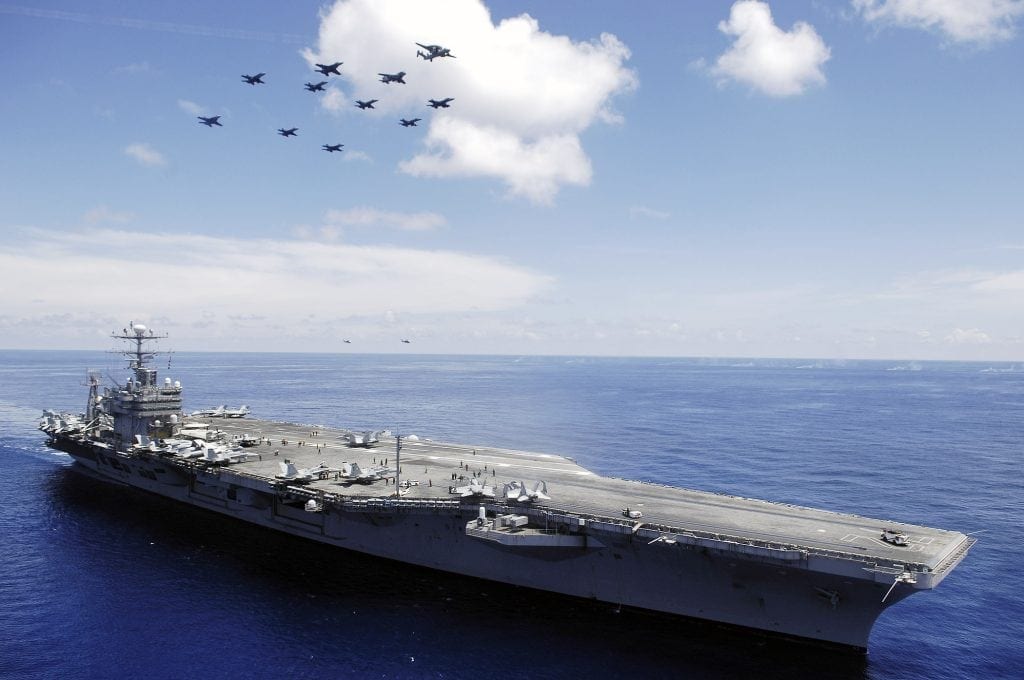
As usual, the US has sent powerful warships to the Spratly Islands in an effort to intimidate Beijing. Gunboat diplomacy has never really died. It has deep roots in the Western mind. (Pictured: USS Abraham Lincoln battle group. USN photo.)
[dropcap]B[/dropcap]aba Beijing is comfortable with Hong Kong’s Legco and district council direct elections, because they closely resemble China’s local elections at the village level. China’s one million villages vote for their leader (mayor), as well as their local People’s congress. And for Hong Kong’s Chief Executive, Baba is comfortable with its Election Committee, because in China, national, provincial, prefectural, and township congresses are elected similarly, via indirect vote, as is America’s president. Baba Beijing knows that Hong Kong’s sober, hard-nosed Electoral Committee is never going to allow a fifth column candidate to be chosen, who might try to destroy the Basic Law Treaty, turning Hong Kong into a color revolution bloodbath. Equally, the United States knows its Electoral College is never going to allow a socialist or a communist to have any serious chance of becoming president. Cornelius West said, “Obama was selected before he was elected”. You can go all the way back to George Washington. Nothing has changed.
As a backdrop to all of this, the United States has spent untold billions of dollars, relentlessly and pathologically trying to bring down Communist rule in China, via the US military, CIA, NSA and NGOs, using Tibet, Xinjiang, Vietnam, Burma, Kyrgyzstan, Taiwan, Japan, Philippines, North & South Korea, Australia, the South China Sea and more recently, in Hong Kong (search any of these references at www.44days.net for well researched articles on this subject).
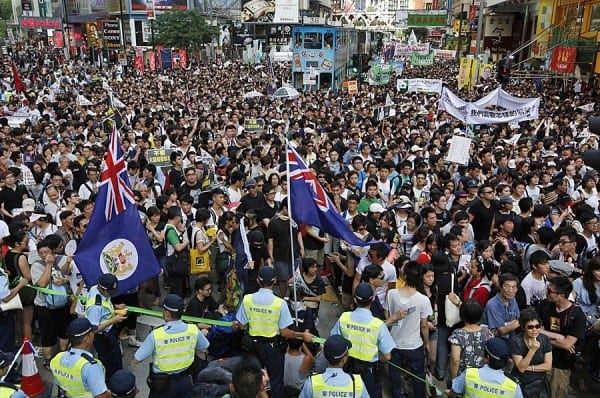
Hong Kong protests. The fuse can be traced to Washington. (Click to expand.)
Baba Beijing continues to counterattack these aforementioned acts of war, as well as studying assiduously the same Western modus operandi in the Ukraine, Russia, Georgia, Moldova, Chechnya, Belarus, Kyrgyzstan, Serbia, Macedonia, Iran, Libya, Iraq, Syria, Lebanon, Palestine, Egypt, Tunisia, Pakistan, Afghanistan, Nigeria, Mali, (South) Sudan, Venezuela, Ecuador, Cuba, Argentina, Bolivia – and if you include Europe’s ongoing, secret service Gladio army – Italy, France, Spain, Portugal, Belgium, Greece, the UK – and on and on, around the planet, during 500 years of Euroamerican colonialism, which all intensified post-WWII, into anticommunist zealotry.
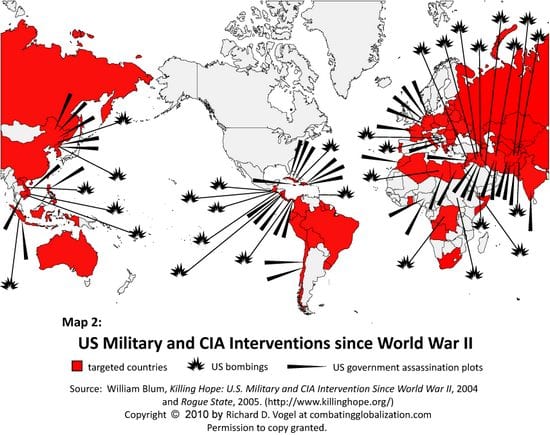
This excellent map does not include the many false flags in the US and UK (JFK, RFK, MLK, 9/11, IRA, etc.), nor destabilization in Venezuela, Thailand, Mali, Nigeria, Tunisia & elsewhere; CIA drug trade in Burma, financial plundering in Argentina (and support for a fascist military junta), safeguarding 9,000 Nazi criminals in South America (including unmarked Uruguay and Argentina), the military occupation of Japan and on and on. Throw in all the assassinations, government overthrows and rigged elections by France’s DGSE across Africa, (http://44days.net/?p=1971) MH370 in Malaysia (http://44days.net/?p=1776 & http://44days.net/?p=2356) – add them all up – and there are only a handful of countries in the world, if any at all, that have not been subverted by Western Empire (image from www.killinghope.org)
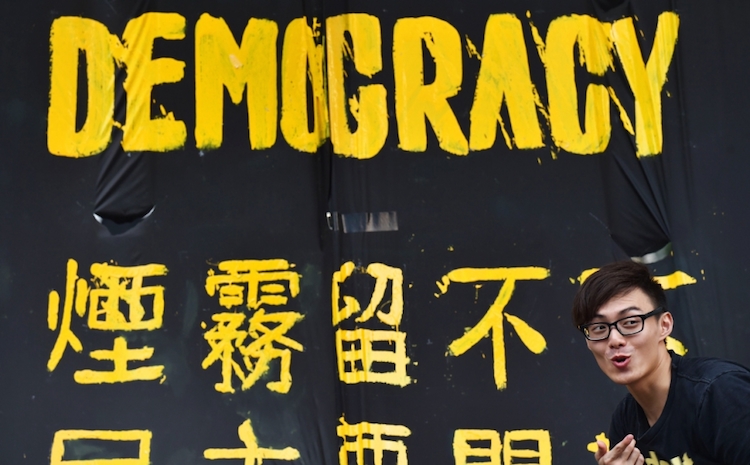
A pro-“democracy” protester, as featured on the South China Morning Post
[dropcap]B[/dropcap]aba Beijing understands that Hong Kong’s ersatz, American manufactured, financed and orchestrated Umbrella Revolution (Occupy Central) is all about spurning Hong Kong’s 2012 Legco and district council popular vote, which was for a solid Pro-Beijing majority, while trying to subvert Hong Kong’s Basic Law, in order to destabilize and eventually overthrow China’s Communist Party. This, so that the West can balkanize and control the People’s Republic of China.

Despite Washington’s subterranean efforts, the Hong Kong “color revolution” unrest eventually fizzled out because the grievances were not deep, and the protesters were mostly comfortable members of the new middle class, useful fools in the West’s new phony crusade.
[dropcap]B[/dropcap]aba Beijing knows that the United States, its vassal countries and their 1% compradors around the world, lust for the glorious, colonial days of Orwell’s powerless niggers, to extract and profit usuriously, from these Dreaded Others’ precious natural resources, just like it did in China for 110 years, during what the Chinese bitterly call, their Century of Humiliation. Baba Beijing is not going to let Hong Kong be turned into another fascist hellhole, like the Ukraine.
Thanks to strong, national leaders like China’s Xi Jinping, Russia’s Vladimir Putin, Venezuela’s Nicolas Maduro, Ecuador’s Rafael Correa, Argentina’s Cristina Fernández de Kirchner, Bolivia’s Evo Morales, Cuba’s Raul Castro, Nicaragua’s Daniel Ortega, Eritrea’s Isaias Afwerki and others, the Hyenas of the Western Empire, for the first time in five centuries, have a real, down and dirty, global fight on their genocidal hands. Here’s to hoping the Dark Side finally loses in the 21st century, spectacularly. The survival of a free humanity depends on it.
ABOUT THE AUTHOR

[box] Beijing correspondent Jeff J. Brown is the author of “44 Days Backpacking in China: The Middle Kingdom in the 21st Century, with the United States, Europe and the Fate of the World in Its Looking Glass” (2013), “Reflections in Sinoland – Musings and Anecdotes from the Belly of the New Century Beast” (2015), and “Doctor WriteRead’s Treasure Trove to Great English” (2015). He is currently writing an historical fiction, “Red Letters – The Diaries of Xi Jinping”, due out in 2016. He is a member of The Anthill, a collective of authors who write about China. Besides The Greanville Post, he also submits articles on Oped News and Firedog Lake. His articles have been published by Paul Craig Roberts, The Saker, Ron Unz, Alternative News Network, Russophile, 15 Minute News, The Daily Coin, Hidden Harmonies and many other websites. He has been a guest on Press TV.
In China, he has been a speaker at TEDx, the Bookworm Literary Festival, the Capital M Literary Festival, the Hutong, as well as being featured in an 18-part series of interviews on Radio Beijing AM774, with former BBC journalist, Bruce Connolly. He has guest lectured at international schools in Beijing and Tianjin. Jeff is a dual national French-American. [/box]
SEE RELATED:
Hong Kong “Occupy Central” Funded by Washington: The Neocons and the National Endowment for Democracy (NED)
Hong Kong Umbrellas are Made in USA
Hong Kong “Occupy Central” Protest Scripted in Washington. Leaders Mislead Grassroots
Hong Kong’s Fight Against Neoliberalism
[printfriendly]
Remember: All captions and pullquotes are furnished by the editors, NOT the author(s).
What is $5 a month to support one of the greatest publications on the Left?

